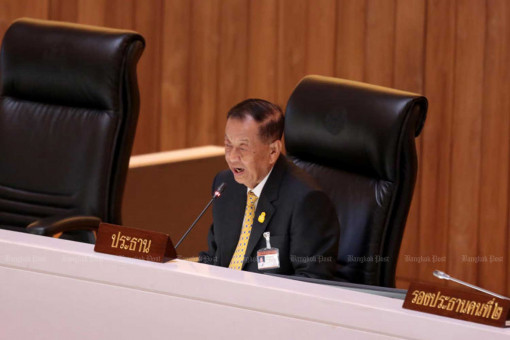PUBLISHED : 25 Jul 2023 at 16:02

Parliament President Wan Muhamad Noor Matha has indefinitely postponed Thursday’s planned joint sitting to vote for a new prime minister, pending a Constitutional Court ruling on the rejected renomination of Move Forward Party leader Pita Limjaroenrat.
Mr Wan said on Tuesday that he made the decision after consulting with legal officials of the House of Representatives and his advisers.
They were of the view that if the prime ministerial vote went ahead on Thursday, it could potentially lead to problems when the Constitutional Court makes its ruling afterwards, the House speaker and ex-officio parliament president said.
With Thursday’s meeting posponted, Wednesday’s planned meeting of whips from the coalition allies, other political parties and senators was now unnecessary, he said.
Another reason for delaying the joint sitting was that many elected MPs and senators were worried they would not be able to attend ceremonies to celebrate His Majesty the King’s birthday in their respective provinces on Friday if the sitting was prolonged, Mr Wan said.
The joint sitting for a prime ministerial vote could be put back on he parliamentary agenda after the court’s ruling.
The parliament president earlier set Thursday for elected representatives and appointed senators to vote again for a new prime minister, possibly from Pheu Thai, the second largest party in the same alliance led by Mr Pita’s MFP.
MFP has agreed to let Pheu Thai take the lead in nominating a prime minister and forming the government. It also faces a challenge because many parties outside the coalition bloc disapprove of MFP’s political platform and plan to revise Section 112 of the Criminal Code, the lese majeste law.
Meanwhile, MFP insists it will continue its efforts to have Mr Pita installed as prime minister.
Mr Pita, leader of the election-winning MFP, failed to win a majority vote from both houses to become the new prime minister on July 13.
Mr Pita was renominated to a joint sitting on July 19 but the parliament rejected it on procedural grounds. Opponents argued it was in violation of parliamentary regulation 41, which prohibits the resubmission of a failed motion during the same parliamentary session.
Mr Pita’s supporters and many academics disagreed with the parliament’s resolution and asked the Constitutional Court to rule on the legality of Mr Pita’s renomination for prime minister.

